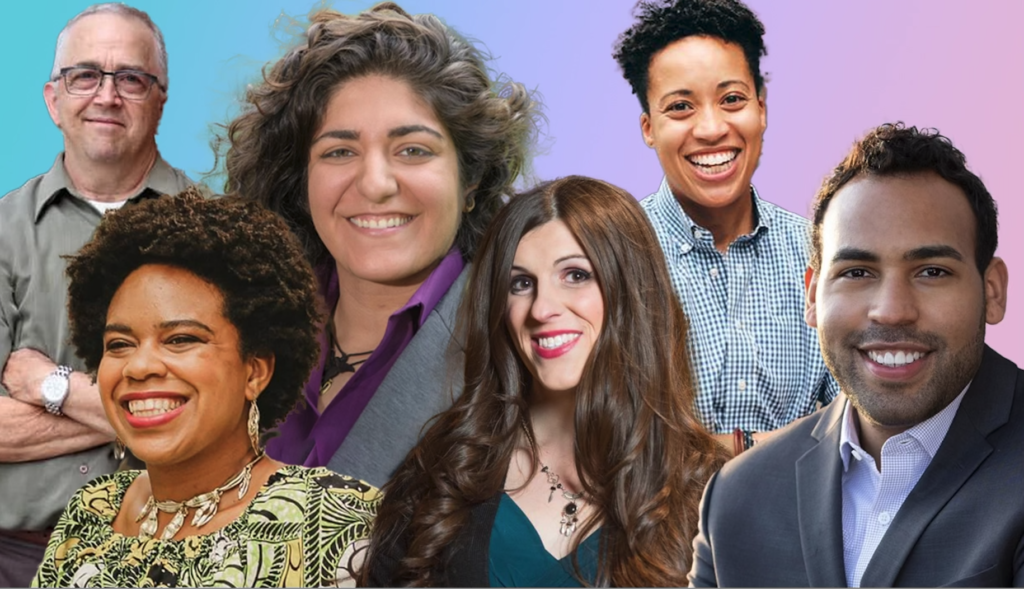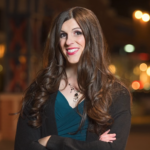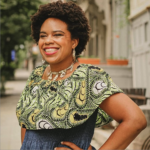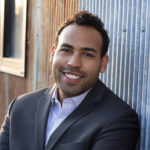
At Least 85 LGBTQ Candidates Elected on November 2
More than 1,000 out officials will serve in the U.S., reports the Victory Fund.

It was a hard night for Democrats on November 2, as candidates for governor in two heavily Democratic states lost enormous support—and at least one of those two seats—to Republicans. But LGBTQ candidates still scored some milestones.
Georgia’s first openly LGBTQ Muslim candidate won their election, scoring a seat on the Atlanta City Council. Meanwhile, Montana’s first Black LGBTQ candidate won their election for a seat on the Bozeman City Commission. Ohio’s first transgender candidate won their election to a local school board. And the first openly LGBTQ woman was elected to the Detroit City Council.
The LGBTQ Victory Fund, a national group that promotes and supports the campaigns of openly LGBTQ candidates, said it was tracking at least 242 openly LGBTQ candidates on the November 2 ballot. Of the organization’s 131 endorsed candidates on the November ballot, 85 had won, 44 had lost, one had advanced to runoffs, and one’s race was undecided.
There were more than 80 openly LGBTQ candidates running for city- and town-council seats this election, plus 11 openly LGBTQ candidates running for mayor. Only nine LGBTQ candidates ran for state House seats, and only one ran for state Senate. There were also at least seven LGBTQ candidates for various local court seats, at leave five other races for miscellaneous posts such as town auditor, and at least 10 LGBTQ candidates running for school-board seats.
Big Fights in Little Races
Local school boards have in recent weeks become the focus of much attention. They appear to have become part of a political strategy favored by conservative Republicans to stir up controversies over LGBTQ books, abortions, and anti-racism curricula. Republican candidates in larger races then use those controversies to pull in moderate voters.
Virginia’s Republican gubernatorial contender, first-time candidate Glenn Youngkin, was laser-focused on “parents” in the final weeks of his successful campaign. He was able to play on stories circulating in the more Democratic northern parts of the state—stories of alleged gay pornography books in public-school libraries and alleged sexual assaults by a transgender student. He promised parents he would make sure they were part of the decision-making process for local school curricula.
The Democratic gubernatorial candidate, former Governor Terry McAuliffe, was drawn into the transgender assault report when, during a September debate, a moderator noted that McAuliffe had expressed agreement with the state’s policies in support of transgender students and the right of local governments to make their own policies. McAuliffe tried to walk a careful line, saying he likes allowing local governments to have input but that “the state will always issue guidance as we do from the Department of Education.”
Youngkin, who was widely praised for running a campaign that kept former President Trump at a studied distance, also walked a narrow political line when asked about the transgender story. He said “we are called on to love everyone” and that not only should local districts make such decisions, but parents should be included in dialogue about such policies, including what books are included in libraries.
The bottom line of that controversy and similar ones, noted one commentator Wednesday morning on CNN, was that “it reminds voters that Democrats are too liberal.” McAuliffe has a strong record of supporting equal rights for LGBTQ people, and released “A Bold Plan to Advance LGBTQ+ Rights.” During his first term as governor, McAuliffe, vetoed a bill in 2017 seeking to give state-funded charities the right to refuse services to LGBTQ people.
Youngkin, a first-time candidate, said on the campaign trail that he does not personally support same-sex marriage but that, as governor, he would support the fact that same-sex marriage “is acceptable in Virginia.”
The Human Rights Campaign endorsed McAuliffe; the Log Cabin Republican group endorsed Youngkin. Log Cabin issued a statement saying Youngkin “has demonstrated his desire to listen to and work with the LGBT community.”
In New Jersey, incumbent Democratic Governor Phil Murray, who earned the endorsement of Garden State Equality, faced Republican State Assemblymember Jack Ciattarelli, who has alienated many with hostile remarks about LGBTQ people. Like the Republican gubernatorial candidate in Virginia, Ciattarelli sought to stoke controversy over LGBTQ issues in public schools, saying “we’re not teaching sodomy in sixth grade.” Specifically, he vowed to undo efforts to make public school curricula more inclusive of LGBTQ history, and to roll back the LGBTQ curriculum. Murray won his race with a narrow 2.3 percentage lead over Ciatarelli.
LGBTQ Race Highlights
While the results of the 10 school-board races were mostly still unreported at deadline, among the highlights of Tuesday’s races involving openly LGBTQ candidates were:

• In a small district in the middle of Ohio, candidate Dion Manley scored the first victory for a transgender candidate for office in the Buckeye State. “Dion shattered a lavender ceiling in Ohio,” said Victory Fund President Annise Parker. She said Manley’s victory “is especially significant given efforts by anti-trans activists across the nation to target trans students at school-board meetings.”

• In Virginia, transgender State House Delegate Danica Roem, who made history in 2017 as the first out transgender person to win and serve in a state legislature (and the only out transgender state legislator in the U.S.), won re-election to a third term. But Roem, who represents part of northern Virginia, defeated her Republican opponent by less than two points, a much smaller margin than in 2019.

• Liliana Bakhtiari became the first openly LGBTQ Muslim to win election in Georgia, succeeding in her second bid to serve on the Atlanta City Council. Although two other openly LGBTQ candidates lost their bids for the Council, voters elected openly gay Alex Wan to return him a seat he previously held.

• All six openly LGBTQ candidates for the New York City Council won, including Crystal Hudson and Kristin Richardson Jordan, the first two Black LGBTQ women to be elected to the 50-member body. Two of the six had uncontested general-election races, but all six were first-time candidates for their seats.

• In Minneapolis, Sheila Nezhad, a former policy analyst for the Williams Institute, was still in the top two in her bid to become Minneapolis mayor. The city uses ranked-choice voting, and results were not yet complete at deadline.
• In Buffalo, New York, India Walton, who identifies as queer, was not able to parlay her stunning primary win of the Democratic nomination into victory in the general election. The incumbent Democratic mayor mounted an aggressive write-in campaign that overwhelmed Walton, a first-time candidate. Local news analysts suggested Walton was “the most progressive of the progressives.”
• In Atlanta, with a field of more than a dozen candidates for mayor, current openly gay city-council member Antonio Brown came in fifth, with only two percent of the vote. The Atlanta Journal Constitution noted that Brown had been saddled with an indictment charging him with bank fraud. He denies the charges, and is scheduled for trial next year. Brown was the only openly LGBTQ mayoral candidate not to earn Victory Fund support in Tuesday’s election.

• And in Bozeman, Montana, Christopher Coburn won election to the City Commission, becoming the first openly LGBTQ Black person to be elected in the state.
© 2021 Keen News Service. All rights reserved.










